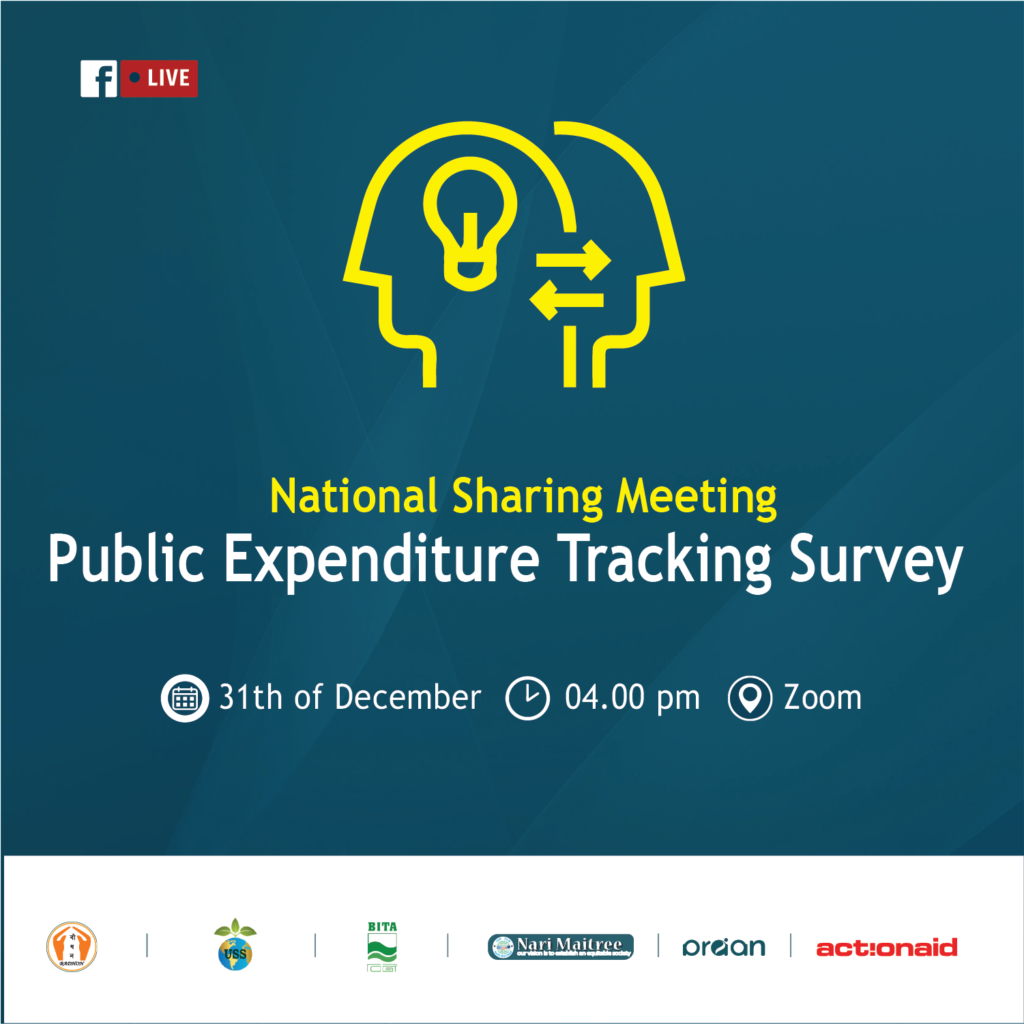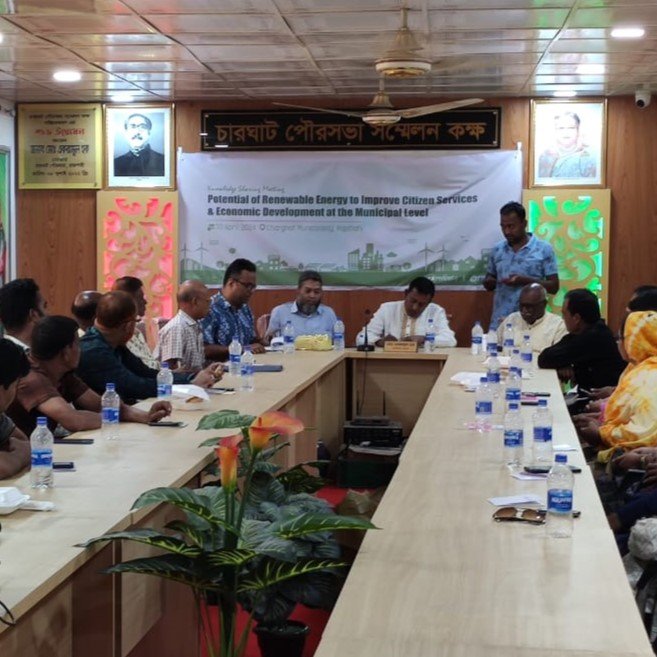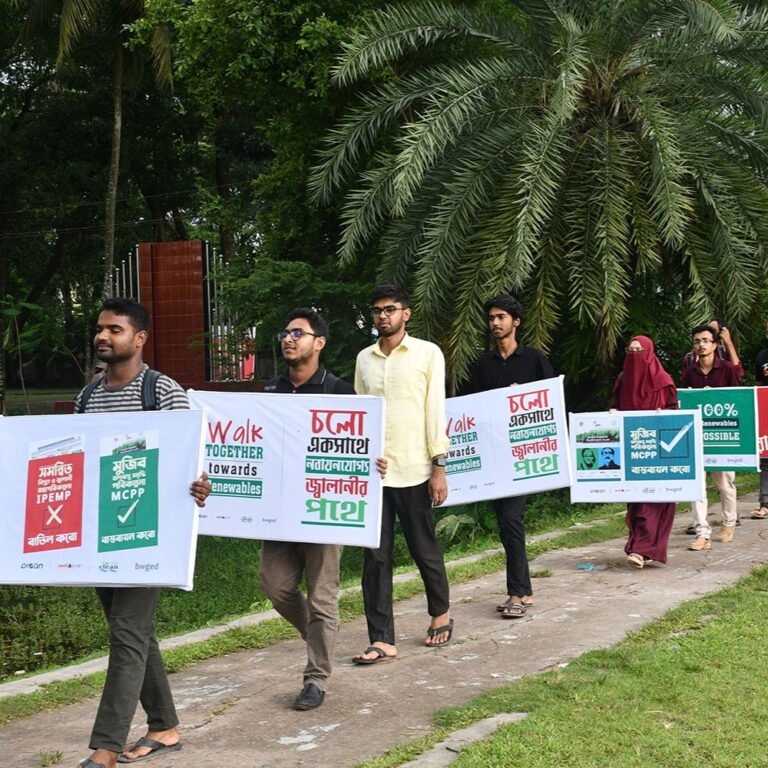![]()
A significant element of the problem of the Public Budget and Expenditure accountability system is that the system has limited capacity to enhance the flow of credible public financial information as a means of reducing the information asymmetry between government and citizens. Public expenditure tracking helps not only the citizens and CSO’s but also governments to ensure that allocated public resources effectively reach their intended beneficiaries.
The speakers expressed their opinion in a virtual event ‘National Level Report Sharing Meeting on Public Expenditure Tracking Report’ on December 21, 2021, organized by Participatory Research & Action Network- PRAAN, more than participants joined the meeting including university teachers, community clinic service providers, youth development center officials, representatives from budget advocacy organizations, representatives from CSO’s directly working with grassroots people, journalists, and young activists.
Department of Youth Development Deputy Director Md. Masudul Hasan Malik, Professor Kazi Maruful Islam, Director, Center and Policy Dialogue Dhaka University, Democratic Budget Movement Secretary Monower Mostafa, Bondhon Executive Director and Treasurer of PRAAN Aminuzzaman Milon, Expenditure Tracking Expert Shahid Ullah, AAB Deputy Manager – QAPS Iqbal Hossain among many others joined the meeting.
Social audits and public hearings were conducted in four different districts of Bangladesh- Dhaka, Chattogam, Bagerhat, and Nilphamari on services of a community clinic, urban dispensary, and youth development training. A compiled report based on the findings was shared at the meeting. The event was broadcasted live on the official Facebook page of PRAAN (Click here). PRAAN Chief Executive Nurul Alam Masud facilitated the event. The Umme Salma, Programme Coordinator of PRAAN presented the report at the sharing meeting.
After presenting the report, the young volunteers directly connected in conducting social audits and public hearings shared their experience in expenditure tracking. While talking about the quality of service in public service institutions, people do not want to express the truth. From Youth Development Training Centre, youth may get training but most of them do not know why they participated in the training programs. It is difficult to find youths who got training and are have taken initiatives for earning. Some youths mentioned that the training is not up-to-date and also not innovative and engaging at the same time. So, the budget allocated for these pieces of training is wasted in a sense, they said. While talking about Community Clinic Services, there remains a huge gap between the service and the need. Most of the people have mentioned the misbehavior of the respective service providers and other officials.
Dr. Kazi Maruf said this is very crucial to meet the quality of public expenditure and also ensure that these are delivered to the right people, in the right way. Such social audits are necessary to understand the real scenario. And it becomes more impactful when the young people take such initiatives.
Social Audits must be directed for social activities and is effective to identify and address problems and weaknesses in systems of public expenditure, transfer, and service delivery, Md. Masudul Hasan Malik, DD of Youth Development Training Center Bagerhat said. He mentioned that in his working area, there is only three people as human resources who are all responsible for managing training, implementation, follow-up, loan management, etc. This is not possible to ensure proper training for all who are in need. This is challenging to bring positive change by these training programs as the youth who come here for training do not know their purpose, and the related officials do not have the opportunity to consult them for the right choice. He expressed his concern that the service providers think that their job is all done as soon as the target set in the Annual Performance Agreement (APA) is reached. But the problem lies here that there is no correlation between the APA targets and real needs in the community.
Mr. Sahidullah clarified the discussion that social audit is not to find the weakness of any specific individual or organization. Rather this is an effective way to understand the system, and systematical shortcomings inherited. Satisfaction or dissatisfaction can be a gross answer in response to service-related questions, the root causes, facts lie deeper. The budgetary system and other development of Bangladesh are not targeted. The citizens are paying the taxes, but the questions remain in the development planning and process. These local level social audits aimed to examine some services and how people-oriented they are. Case in point, the government has initiated Community Clinic to extend Primary Health Care to the doorsteps of rural people all over rural Bangladesh. But there is a remarkable difference between the service being provided and the local needs. And such gaps will continue to exist if the government does not design community-oriented budget and development planning.
Iqbal Hossain from ActionAid Bangladesh said, ‘We wanted to see how friendly the communication space is for local services and community participation. Those who provide services must be responsible as well as service recipients. We have tried to work towards ensuring rights in a participatory way.’
We have a fundamental problem – the lack of information, as well as the authenticity. We don’t get services because everything we do is supply-driven, not demand-driven. Due to a lack of information, we do not understand the extent of service dependence when looking at the place of reality. Our statistics department doesn’t work that way either. Even in the case of important sectors like education, health, employment, etc., it is seen that the central government process does not have smooth communication with the local government authorities. Whether it is the Ministry of Youth Development or the Ministry of Health, no one is involved in the formulation and implementation of the plan. If the local needs were known through communication with the local government and the budget was prepared and spent accordingly, there would not be much difference between the services and the demand.
Different regional coordinators of Budget Olympiad, another initiative by the Democratic Budget Movement, and young volunteers working with community people also joined. The young participants expressed their interest in taking similar initiatives in the future to bring improvement in public services for their community.




